Leadership and Management for Service Industry: The Ledbury Report
VerifiedAdded on 2023/01/12
|15
|4793
|33
Report
AI Summary
This report delves into the critical aspects of leadership and management within the service industry, with a specific focus on The Ledbury, a prominent establishment in the UK's hospitality sector. The report is structured into two primary projects. Project 1 examines classical management theories, such as scientific and administrative management, and their application within a culturally diverse hospitality setting. It also explores the roles of leaders and various leadership styles, including authoritarian, participative, and hands-off approaches, while analyzing the management and leadership styles at The Ledbury. Furthermore, it investigates the internal and external factors influencing management styles and structures. Project 2 assesses current and future management and leadership skills essential for the service sector, discussing both hard and soft skills. The report also compares and contrasts different change management systems within the industry. The conclusion synthesizes the findings, emphasizing the importance of effective leadership and management in achieving organizational goals and maintaining a competitive edge in the dynamic service landscape.
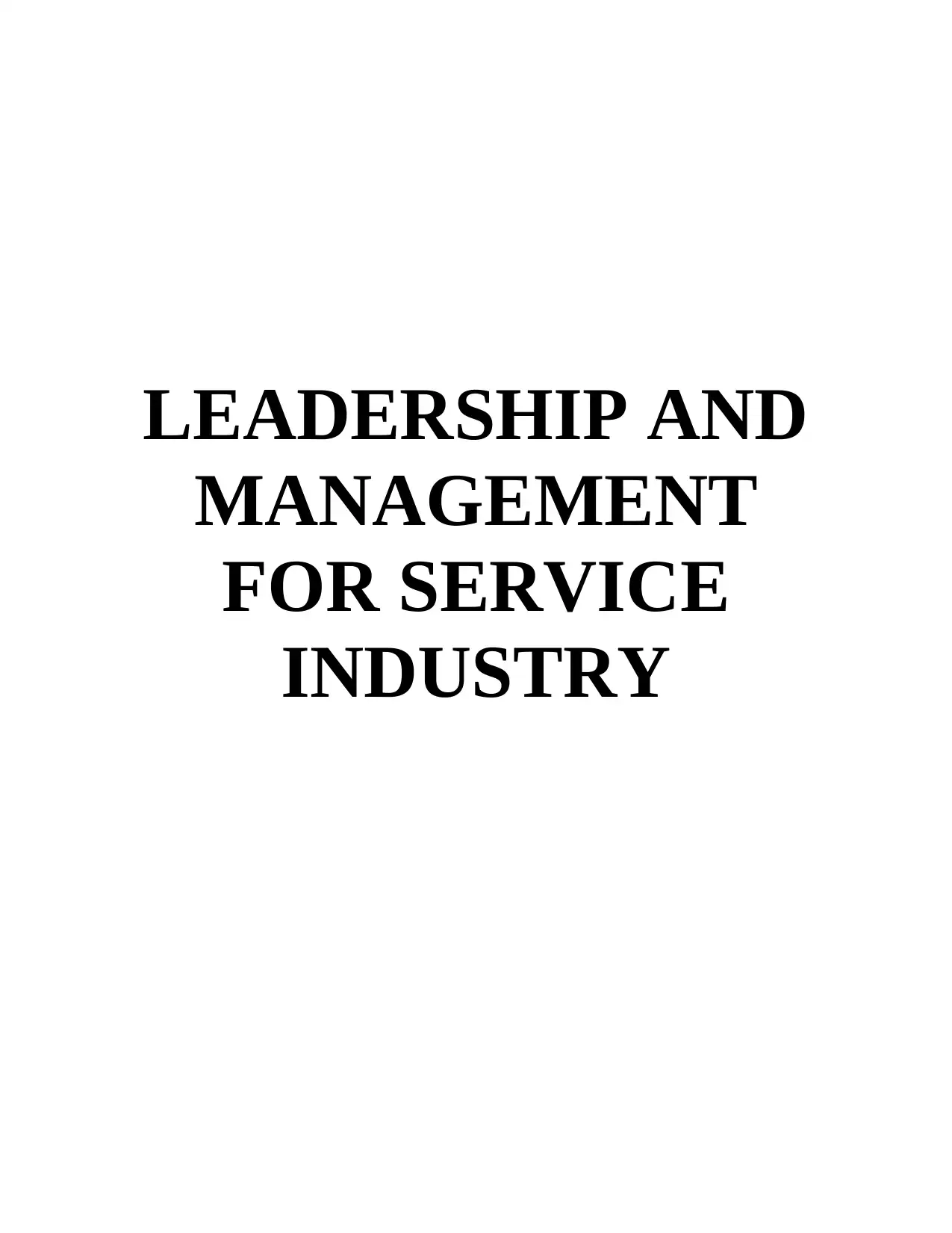
LEADERSHIP AND
MANAGEMENT
FOR SERVICE
INDUSTRY
MANAGEMENT
FOR SERVICE
INDUSTRY
Paraphrase This Document
Need a fresh take? Get an instant paraphrase of this document with our AI Paraphraser
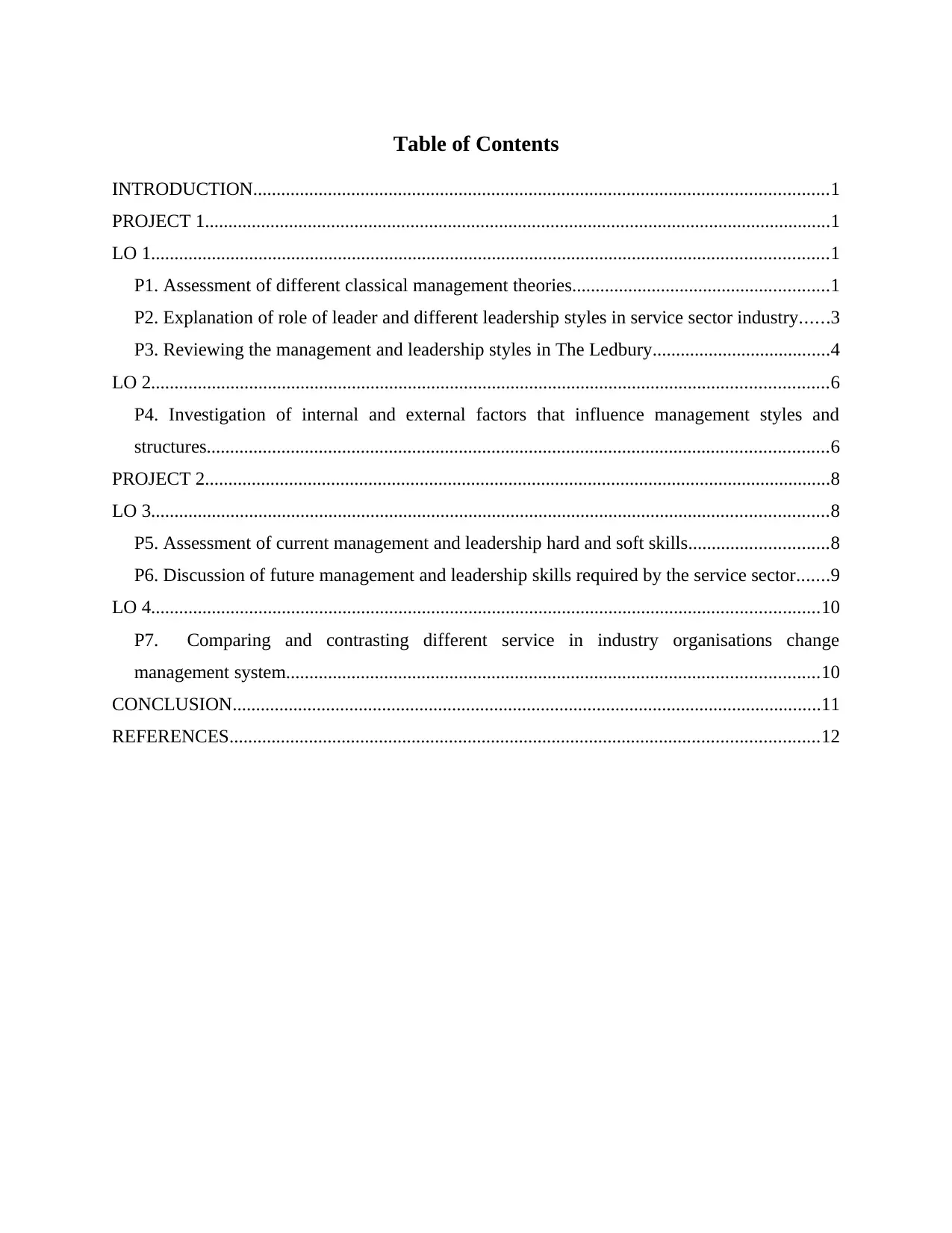
Table of Contents
INTRODUCTION...........................................................................................................................1
PROJECT 1......................................................................................................................................1
LO 1.................................................................................................................................................1
P1. Assessment of different classical management theories.......................................................1
P2. Explanation of role of leader and different leadership styles in service sector industry......3
P3. Reviewing the management and leadership styles in The Ledbury......................................4
LO 2.................................................................................................................................................6
P4. Investigation of internal and external factors that influence management styles and
structures.....................................................................................................................................6
PROJECT 2......................................................................................................................................8
LO 3.................................................................................................................................................8
P5. Assessment of current management and leadership hard and soft skills..............................8
P6. Discussion of future management and leadership skills required by the service sector.......9
LO 4...............................................................................................................................................10
P7. Comparing and contrasting different service in industry organisations change
management system..................................................................................................................10
CONCLUSION..............................................................................................................................11
REFERENCES..............................................................................................................................12
INTRODUCTION...........................................................................................................................1
PROJECT 1......................................................................................................................................1
LO 1.................................................................................................................................................1
P1. Assessment of different classical management theories.......................................................1
P2. Explanation of role of leader and different leadership styles in service sector industry......3
P3. Reviewing the management and leadership styles in The Ledbury......................................4
LO 2.................................................................................................................................................6
P4. Investigation of internal and external factors that influence management styles and
structures.....................................................................................................................................6
PROJECT 2......................................................................................................................................8
LO 3.................................................................................................................................................8
P5. Assessment of current management and leadership hard and soft skills..............................8
P6. Discussion of future management and leadership skills required by the service sector.......9
LO 4...............................................................................................................................................10
P7. Comparing and contrasting different service in industry organisations change
management system..................................................................................................................10
CONCLUSION..............................................................................................................................11
REFERENCES..............................................................................................................................12
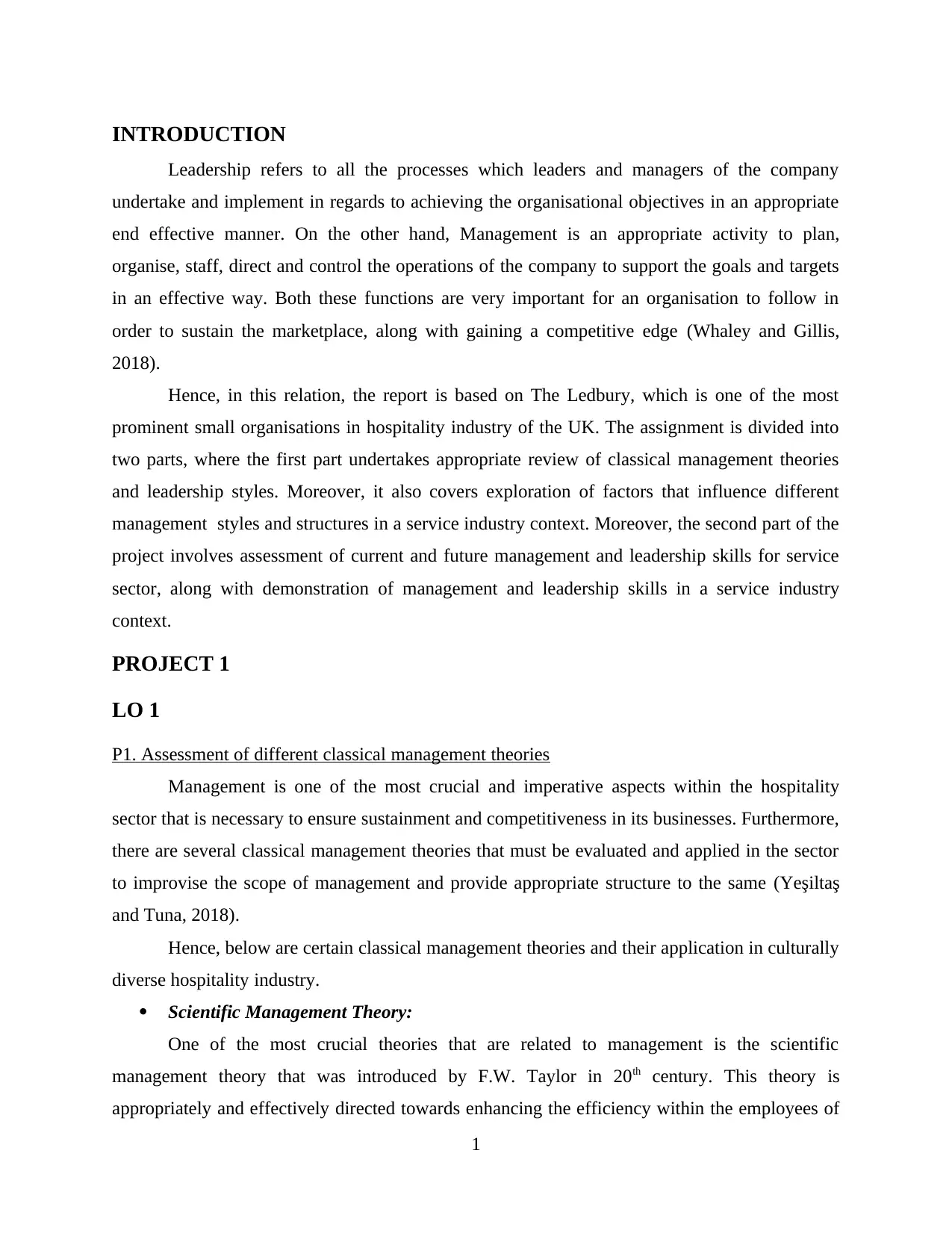
INTRODUCTION
Leadership refers to all the processes which leaders and managers of the company
undertake and implement in regards to achieving the organisational objectives in an appropriate
end effective manner. On the other hand, Management is an appropriate activity to plan,
organise, staff, direct and control the operations of the company to support the goals and targets
in an effective way. Both these functions are very important for an organisation to follow in
order to sustain the marketplace, along with gaining a competitive edge (Whaley and Gillis,
2018).
Hence, in this relation, the report is based on The Ledbury, which is one of the most
prominent small organisations in hospitality industry of the UK. The assignment is divided into
two parts, where the first part undertakes appropriate review of classical management theories
and leadership styles. Moreover, it also covers exploration of factors that influence different
management styles and structures in a service industry context. Moreover, the second part of the
project involves assessment of current and future management and leadership skills for service
sector, along with demonstration of management and leadership skills in a service industry
context.
PROJECT 1
LO 1
P1. Assessment of different classical management theories
Management is one of the most crucial and imperative aspects within the hospitality
sector that is necessary to ensure sustainment and competitiveness in its businesses. Furthermore,
there are several classical management theories that must be evaluated and applied in the sector
to improvise the scope of management and provide appropriate structure to the same (Yeşiltaş
and Tuna, 2018).
Hence, below are certain classical management theories and their application in culturally
diverse hospitality industry.
Scientific Management Theory:
One of the most crucial theories that are related to management is the scientific
management theory that was introduced by F.W. Taylor in 20th century. This theory is
appropriately and effectively directed towards enhancing the efficiency within the employees of
1
Leadership refers to all the processes which leaders and managers of the company
undertake and implement in regards to achieving the organisational objectives in an appropriate
end effective manner. On the other hand, Management is an appropriate activity to plan,
organise, staff, direct and control the operations of the company to support the goals and targets
in an effective way. Both these functions are very important for an organisation to follow in
order to sustain the marketplace, along with gaining a competitive edge (Whaley and Gillis,
2018).
Hence, in this relation, the report is based on The Ledbury, which is one of the most
prominent small organisations in hospitality industry of the UK. The assignment is divided into
two parts, where the first part undertakes appropriate review of classical management theories
and leadership styles. Moreover, it also covers exploration of factors that influence different
management styles and structures in a service industry context. Moreover, the second part of the
project involves assessment of current and future management and leadership skills for service
sector, along with demonstration of management and leadership skills in a service industry
context.
PROJECT 1
LO 1
P1. Assessment of different classical management theories
Management is one of the most crucial and imperative aspects within the hospitality
sector that is necessary to ensure sustainment and competitiveness in its businesses. Furthermore,
there are several classical management theories that must be evaluated and applied in the sector
to improvise the scope of management and provide appropriate structure to the same (Yeşiltaş
and Tuna, 2018).
Hence, below are certain classical management theories and their application in culturally
diverse hospitality industry.
Scientific Management Theory:
One of the most crucial theories that are related to management is the scientific
management theory that was introduced by F.W. Taylor in 20th century. This theory is
appropriately and effectively directed towards enhancing the efficiency within the employees of
1
⊘ This is a preview!⊘
Do you want full access?
Subscribe today to unlock all pages.

Trusted by 1+ million students worldwide
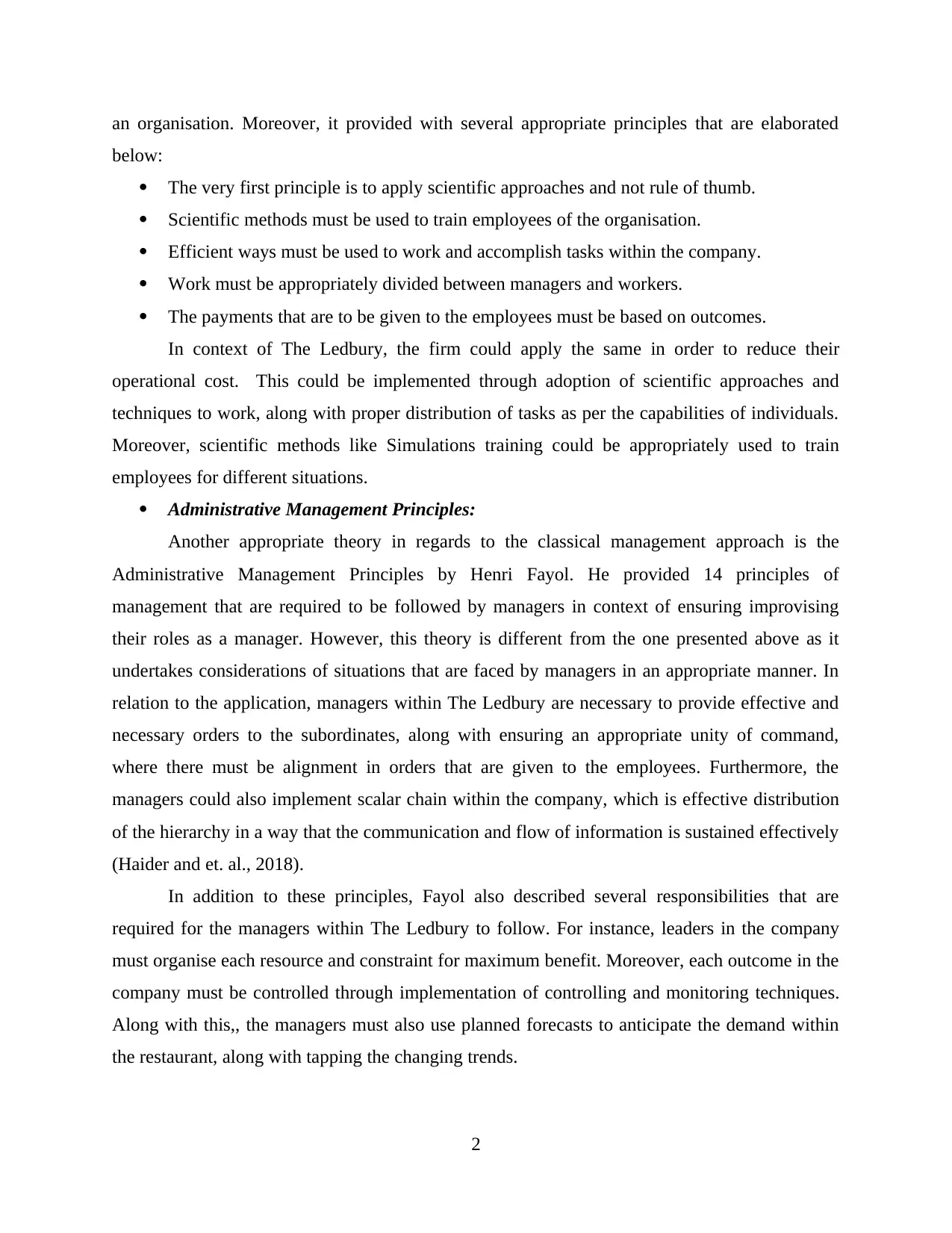
an organisation. Moreover, it provided with several appropriate principles that are elaborated
below:
The very first principle is to apply scientific approaches and not rule of thumb.
Scientific methods must be used to train employees of the organisation.
Efficient ways must be used to work and accomplish tasks within the company.
Work must be appropriately divided between managers and workers.
The payments that are to be given to the employees must be based on outcomes.
In context of The Ledbury, the firm could apply the same in order to reduce their
operational cost. This could be implemented through adoption of scientific approaches and
techniques to work, along with proper distribution of tasks as per the capabilities of individuals.
Moreover, scientific methods like Simulations training could be appropriately used to train
employees for different situations.
Administrative Management Principles:
Another appropriate theory in regards to the classical management approach is the
Administrative Management Principles by Henri Fayol. He provided 14 principles of
management that are required to be followed by managers in context of ensuring improvising
their roles as a manager. However, this theory is different from the one presented above as it
undertakes considerations of situations that are faced by managers in an appropriate manner. In
relation to the application, managers within The Ledbury are necessary to provide effective and
necessary orders to the subordinates, along with ensuring an appropriate unity of command,
where there must be alignment in orders that are given to the employees. Furthermore, the
managers could also implement scalar chain within the company, which is effective distribution
of the hierarchy in a way that the communication and flow of information is sustained effectively
(Haider and et. al., 2018).
In addition to these principles, Fayol also described several responsibilities that are
required for the managers within The Ledbury to follow. For instance, leaders in the company
must organise each resource and constraint for maximum benefit. Moreover, each outcome in the
company must be controlled through implementation of controlling and monitoring techniques.
Along with this,, the managers must also use planned forecasts to anticipate the demand within
the restaurant, along with tapping the changing trends.
2
below:
The very first principle is to apply scientific approaches and not rule of thumb.
Scientific methods must be used to train employees of the organisation.
Efficient ways must be used to work and accomplish tasks within the company.
Work must be appropriately divided between managers and workers.
The payments that are to be given to the employees must be based on outcomes.
In context of The Ledbury, the firm could apply the same in order to reduce their
operational cost. This could be implemented through adoption of scientific approaches and
techniques to work, along with proper distribution of tasks as per the capabilities of individuals.
Moreover, scientific methods like Simulations training could be appropriately used to train
employees for different situations.
Administrative Management Principles:
Another appropriate theory in regards to the classical management approach is the
Administrative Management Principles by Henri Fayol. He provided 14 principles of
management that are required to be followed by managers in context of ensuring improvising
their roles as a manager. However, this theory is different from the one presented above as it
undertakes considerations of situations that are faced by managers in an appropriate manner. In
relation to the application, managers within The Ledbury are necessary to provide effective and
necessary orders to the subordinates, along with ensuring an appropriate unity of command,
where there must be alignment in orders that are given to the employees. Furthermore, the
managers could also implement scalar chain within the company, which is effective distribution
of the hierarchy in a way that the communication and flow of information is sustained effectively
(Haider and et. al., 2018).
In addition to these principles, Fayol also described several responsibilities that are
required for the managers within The Ledbury to follow. For instance, leaders in the company
must organise each resource and constraint for maximum benefit. Moreover, each outcome in the
company must be controlled through implementation of controlling and monitoring techniques.
Along with this,, the managers must also use planned forecasts to anticipate the demand within
the restaurant, along with tapping the changing trends.
2
Paraphrase This Document
Need a fresh take? Get an instant paraphrase of this document with our AI Paraphraser
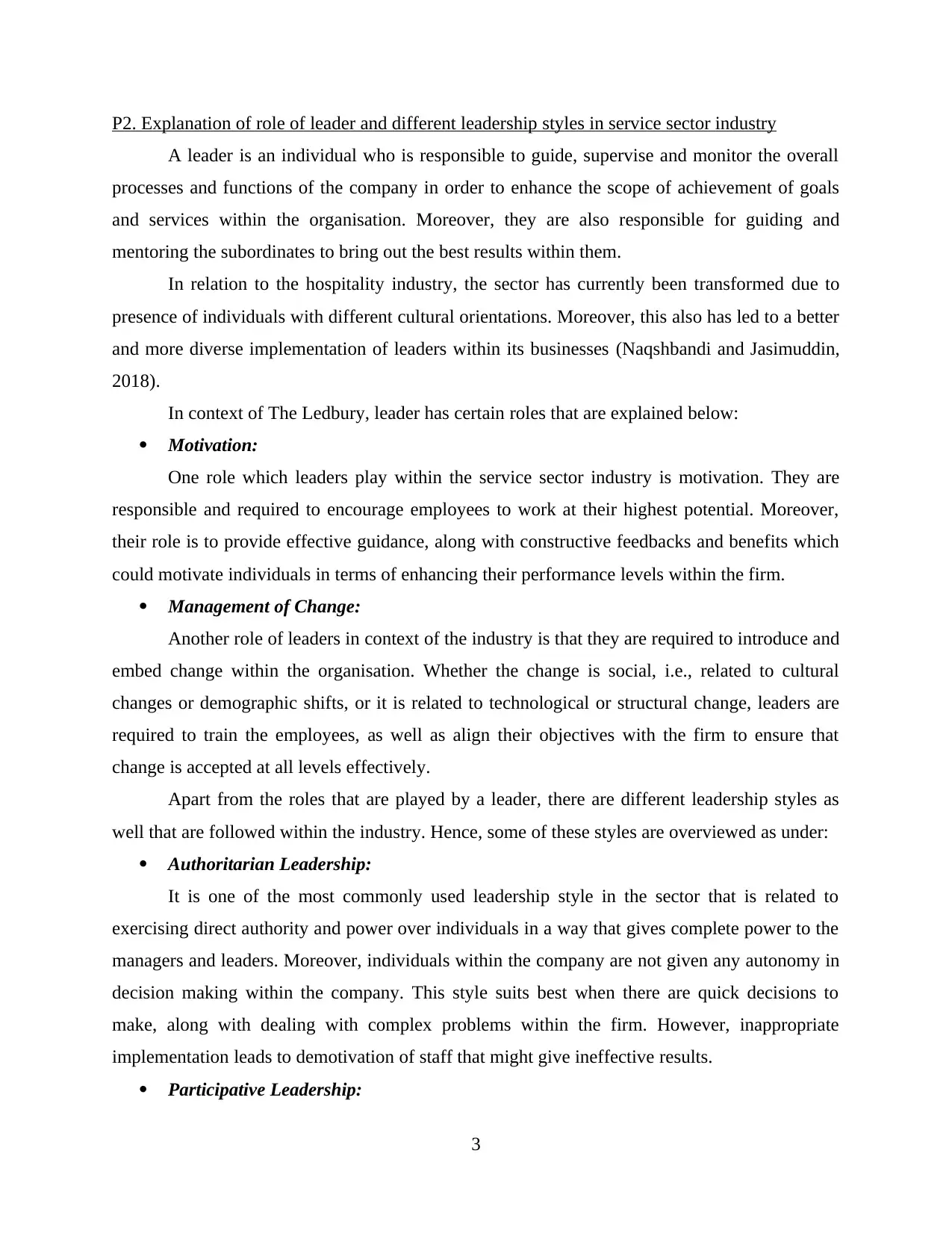
P2. Explanation of role of leader and different leadership styles in service sector industry
A leader is an individual who is responsible to guide, supervise and monitor the overall
processes and functions of the company in order to enhance the scope of achievement of goals
and services within the organisation. Moreover, they are also responsible for guiding and
mentoring the subordinates to bring out the best results within them.
In relation to the hospitality industry, the sector has currently been transformed due to
presence of individuals with different cultural orientations. Moreover, this also has led to a better
and more diverse implementation of leaders within its businesses (Naqshbandi and Jasimuddin,
2018).
In context of The Ledbury, leader has certain roles that are explained below:
Motivation:
One role which leaders play within the service sector industry is motivation. They are
responsible and required to encourage employees to work at their highest potential. Moreover,
their role is to provide effective guidance, along with constructive feedbacks and benefits which
could motivate individuals in terms of enhancing their performance levels within the firm.
Management of Change:
Another role of leaders in context of the industry is that they are required to introduce and
embed change within the organisation. Whether the change is social, i.e., related to cultural
changes or demographic shifts, or it is related to technological or structural change, leaders are
required to train the employees, as well as align their objectives with the firm to ensure that
change is accepted at all levels effectively.
Apart from the roles that are played by a leader, there are different leadership styles as
well that are followed within the industry. Hence, some of these styles are overviewed as under:
Authoritarian Leadership:
It is one of the most commonly used leadership style in the sector that is related to
exercising direct authority and power over individuals in a way that gives complete power to the
managers and leaders. Moreover, individuals within the company are not given any autonomy in
decision making within the company. This style suits best when there are quick decisions to
make, along with dealing with complex problems within the firm. However, inappropriate
implementation leads to demotivation of staff that might give ineffective results.
Participative Leadership:
3
A leader is an individual who is responsible to guide, supervise and monitor the overall
processes and functions of the company in order to enhance the scope of achievement of goals
and services within the organisation. Moreover, they are also responsible for guiding and
mentoring the subordinates to bring out the best results within them.
In relation to the hospitality industry, the sector has currently been transformed due to
presence of individuals with different cultural orientations. Moreover, this also has led to a better
and more diverse implementation of leaders within its businesses (Naqshbandi and Jasimuddin,
2018).
In context of The Ledbury, leader has certain roles that are explained below:
Motivation:
One role which leaders play within the service sector industry is motivation. They are
responsible and required to encourage employees to work at their highest potential. Moreover,
their role is to provide effective guidance, along with constructive feedbacks and benefits which
could motivate individuals in terms of enhancing their performance levels within the firm.
Management of Change:
Another role of leaders in context of the industry is that they are required to introduce and
embed change within the organisation. Whether the change is social, i.e., related to cultural
changes or demographic shifts, or it is related to technological or structural change, leaders are
required to train the employees, as well as align their objectives with the firm to ensure that
change is accepted at all levels effectively.
Apart from the roles that are played by a leader, there are different leadership styles as
well that are followed within the industry. Hence, some of these styles are overviewed as under:
Authoritarian Leadership:
It is one of the most commonly used leadership style in the sector that is related to
exercising direct authority and power over individuals in a way that gives complete power to the
managers and leaders. Moreover, individuals within the company are not given any autonomy in
decision making within the company. This style suits best when there are quick decisions to
make, along with dealing with complex problems within the firm. However, inappropriate
implementation leads to demotivation of staff that might give ineffective results.
Participative Leadership:
3
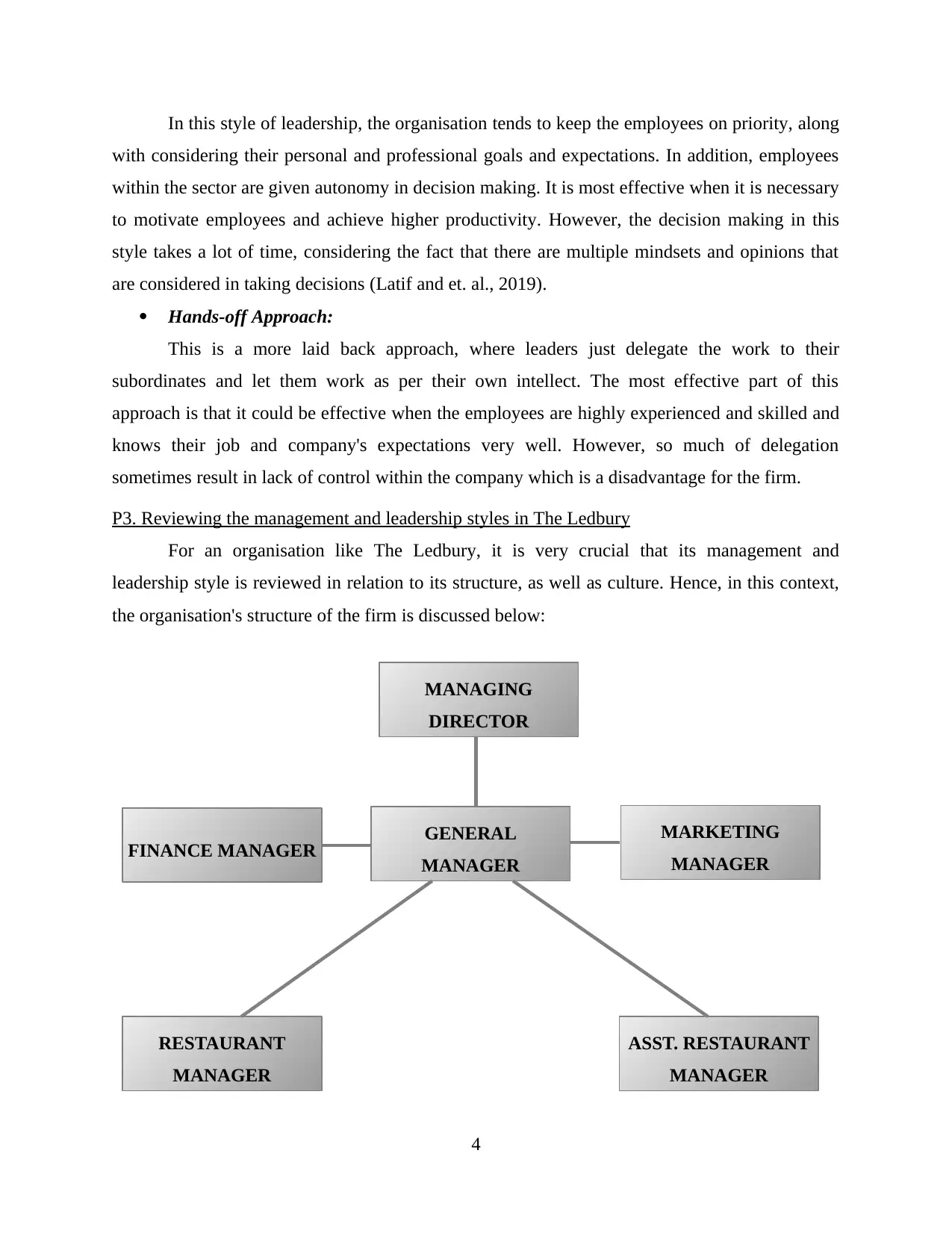
In this style of leadership, the organisation tends to keep the employees on priority, along
with considering their personal and professional goals and expectations. In addition, employees
within the sector are given autonomy in decision making. It is most effective when it is necessary
to motivate employees and achieve higher productivity. However, the decision making in this
style takes a lot of time, considering the fact that there are multiple mindsets and opinions that
are considered in taking decisions (Latif and et. al., 2019).
Hands-off Approach:
This is a more laid back approach, where leaders just delegate the work to their
subordinates and let them work as per their own intellect. The most effective part of this
approach is that it could be effective when the employees are highly experienced and skilled and
knows their job and company's expectations very well. However, so much of delegation
sometimes result in lack of control within the company which is a disadvantage for the firm.
P3. Reviewing the management and leadership styles in The Ledbury
For an organisation like The Ledbury, it is very crucial that its management and
leadership style is reviewed in relation to its structure, as well as culture. Hence, in this context,
the organisation's structure of the firm is discussed below:
4
MANAGING
DIRECTOR
MARKETING
MANAGER
GENERAL
MANAGER
FINANCE MANAGER
RESTAURANT
MANAGER
ASST. RESTAURANT
MANAGER
with considering their personal and professional goals and expectations. In addition, employees
within the sector are given autonomy in decision making. It is most effective when it is necessary
to motivate employees and achieve higher productivity. However, the decision making in this
style takes a lot of time, considering the fact that there are multiple mindsets and opinions that
are considered in taking decisions (Latif and et. al., 2019).
Hands-off Approach:
This is a more laid back approach, where leaders just delegate the work to their
subordinates and let them work as per their own intellect. The most effective part of this
approach is that it could be effective when the employees are highly experienced and skilled and
knows their job and company's expectations very well. However, so much of delegation
sometimes result in lack of control within the company which is a disadvantage for the firm.
P3. Reviewing the management and leadership styles in The Ledbury
For an organisation like The Ledbury, it is very crucial that its management and
leadership style is reviewed in relation to its structure, as well as culture. Hence, in this context,
the organisation's structure of the firm is discussed below:
4
MANAGING
DIRECTOR
MARKETING
MANAGER
GENERAL
MANAGER
FINANCE MANAGER
RESTAURANT
MANAGER
ASST. RESTAURANT
MANAGER
⊘ This is a preview!⊘
Do you want full access?
Subscribe today to unlock all pages.

Trusted by 1+ million students worldwide
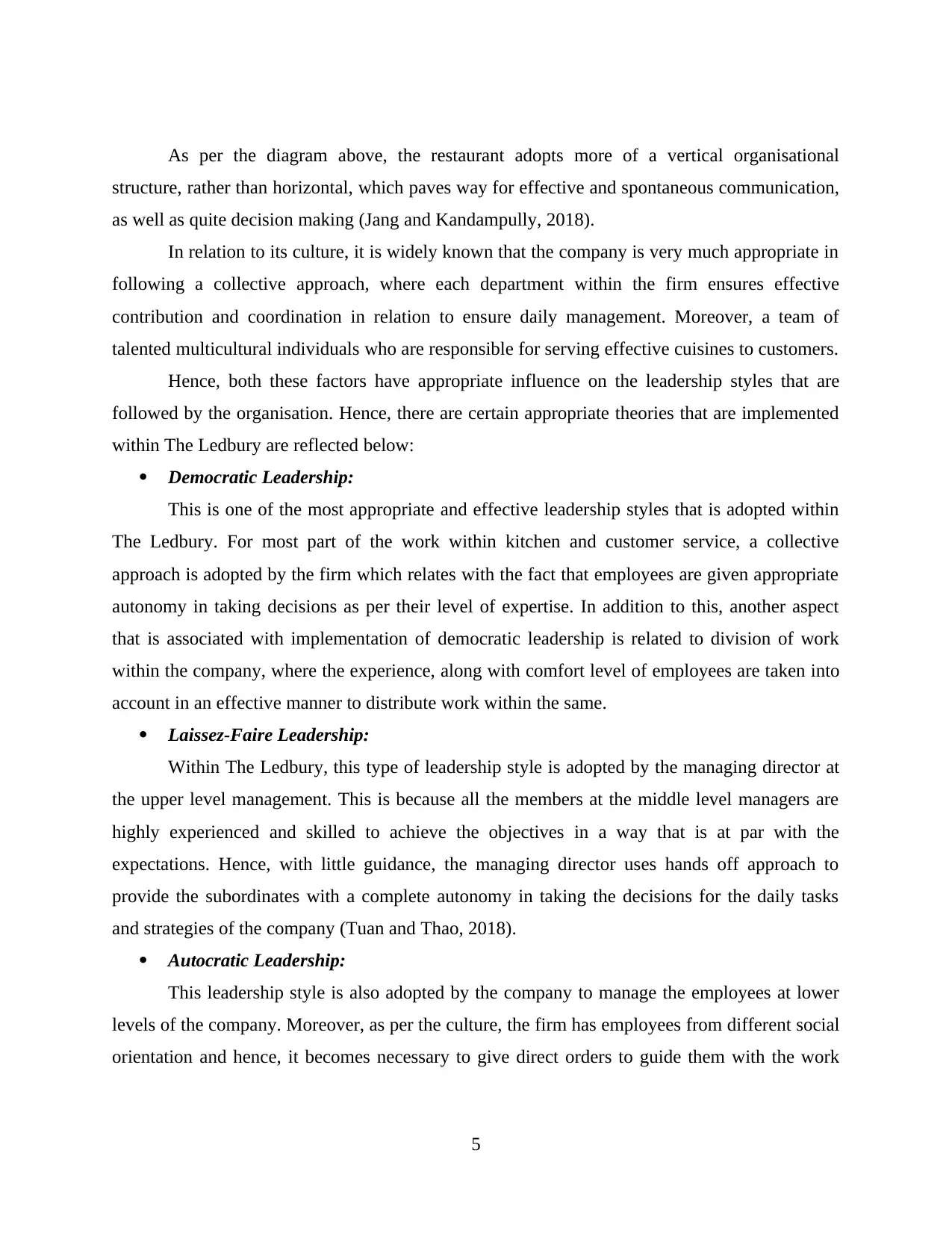
As per the diagram above, the restaurant adopts more of a vertical organisational
structure, rather than horizontal, which paves way for effective and spontaneous communication,
as well as quite decision making (Jang and Kandampully, 2018).
In relation to its culture, it is widely known that the company is very much appropriate in
following a collective approach, where each department within the firm ensures effective
contribution and coordination in relation to ensure daily management. Moreover, a team of
talented multicultural individuals who are responsible for serving effective cuisines to customers.
Hence, both these factors have appropriate influence on the leadership styles that are
followed by the organisation. Hence, there are certain appropriate theories that are implemented
within The Ledbury are reflected below:
Democratic Leadership:
This is one of the most appropriate and effective leadership styles that is adopted within
The Ledbury. For most part of the work within kitchen and customer service, a collective
approach is adopted by the firm which relates with the fact that employees are given appropriate
autonomy in taking decisions as per their level of expertise. In addition to this, another aspect
that is associated with implementation of democratic leadership is related to division of work
within the company, where the experience, along with comfort level of employees are taken into
account in an effective manner to distribute work within the same.
Laissez-Faire Leadership:
Within The Ledbury, this type of leadership style is adopted by the managing director at
the upper level management. This is because all the members at the middle level managers are
highly experienced and skilled to achieve the objectives in a way that is at par with the
expectations. Hence, with little guidance, the managing director uses hands off approach to
provide the subordinates with a complete autonomy in taking the decisions for the daily tasks
and strategies of the company (Tuan and Thao, 2018).
Autocratic Leadership:
This leadership style is also adopted by the company to manage the employees at lower
levels of the company. Moreover, as per the culture, the firm has employees from different social
orientation and hence, it becomes necessary to give direct orders to guide them with the work
5
structure, rather than horizontal, which paves way for effective and spontaneous communication,
as well as quite decision making (Jang and Kandampully, 2018).
In relation to its culture, it is widely known that the company is very much appropriate in
following a collective approach, where each department within the firm ensures effective
contribution and coordination in relation to ensure daily management. Moreover, a team of
talented multicultural individuals who are responsible for serving effective cuisines to customers.
Hence, both these factors have appropriate influence on the leadership styles that are
followed by the organisation. Hence, there are certain appropriate theories that are implemented
within The Ledbury are reflected below:
Democratic Leadership:
This is one of the most appropriate and effective leadership styles that is adopted within
The Ledbury. For most part of the work within kitchen and customer service, a collective
approach is adopted by the firm which relates with the fact that employees are given appropriate
autonomy in taking decisions as per their level of expertise. In addition to this, another aspect
that is associated with implementation of democratic leadership is related to division of work
within the company, where the experience, along with comfort level of employees are taken into
account in an effective manner to distribute work within the same.
Laissez-Faire Leadership:
Within The Ledbury, this type of leadership style is adopted by the managing director at
the upper level management. This is because all the members at the middle level managers are
highly experienced and skilled to achieve the objectives in a way that is at par with the
expectations. Hence, with little guidance, the managing director uses hands off approach to
provide the subordinates with a complete autonomy in taking the decisions for the daily tasks
and strategies of the company (Tuan and Thao, 2018).
Autocratic Leadership:
This leadership style is also adopted by the company to manage the employees at lower
levels of the company. Moreover, as per the culture, the firm has employees from different social
orientation and hence, it becomes necessary to give direct orders to guide them with the work
5
Paraphrase This Document
Need a fresh take? Get an instant paraphrase of this document with our AI Paraphraser
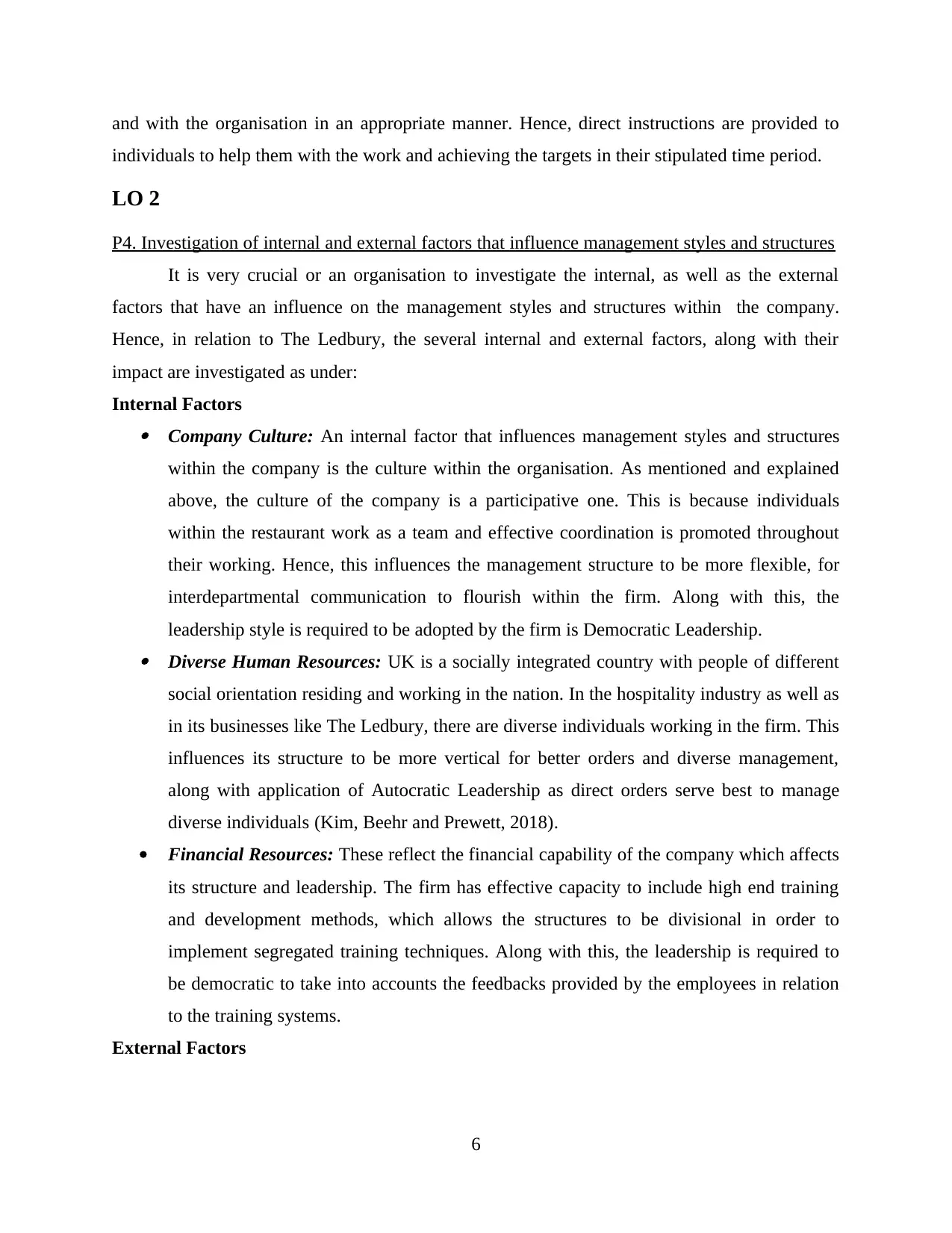
and with the organisation in an appropriate manner. Hence, direct instructions are provided to
individuals to help them with the work and achieving the targets in their stipulated time period.
LO 2
P4. Investigation of internal and external factors that influence management styles and structures
It is very crucial or an organisation to investigate the internal, as well as the external
factors that have an influence on the management styles and structures within the company.
Hence, in relation to The Ledbury, the several internal and external factors, along with their
impact are investigated as under:
Internal Factors Company Culture: An internal factor that influences management styles and structures
within the company is the culture within the organisation. As mentioned and explained
above, the culture of the company is a participative one. This is because individuals
within the restaurant work as a team and effective coordination is promoted throughout
their working. Hence, this influences the management structure to be more flexible, for
interdepartmental communication to flourish within the firm. Along with this, the
leadership style is required to be adopted by the firm is Democratic Leadership. Diverse Human Resources: UK is a socially integrated country with people of different
social orientation residing and working in the nation. In the hospitality industry as well as
in its businesses like The Ledbury, there are diverse individuals working in the firm. This
influences its structure to be more vertical for better orders and diverse management,
along with application of Autocratic Leadership as direct orders serve best to manage
diverse individuals (Kim, Beehr and Prewett, 2018).
Financial Resources: These reflect the financial capability of the company which affects
its structure and leadership. The firm has effective capacity to include high end training
and development methods, which allows the structures to be divisional in order to
implement segregated training techniques. Along with this, the leadership is required to
be democratic to take into accounts the feedbacks provided by the employees in relation
to the training systems.
External Factors
6
individuals to help them with the work and achieving the targets in their stipulated time period.
LO 2
P4. Investigation of internal and external factors that influence management styles and structures
It is very crucial or an organisation to investigate the internal, as well as the external
factors that have an influence on the management styles and structures within the company.
Hence, in relation to The Ledbury, the several internal and external factors, along with their
impact are investigated as under:
Internal Factors Company Culture: An internal factor that influences management styles and structures
within the company is the culture within the organisation. As mentioned and explained
above, the culture of the company is a participative one. This is because individuals
within the restaurant work as a team and effective coordination is promoted throughout
their working. Hence, this influences the management structure to be more flexible, for
interdepartmental communication to flourish within the firm. Along with this, the
leadership style is required to be adopted by the firm is Democratic Leadership. Diverse Human Resources: UK is a socially integrated country with people of different
social orientation residing and working in the nation. In the hospitality industry as well as
in its businesses like The Ledbury, there are diverse individuals working in the firm. This
influences its structure to be more vertical for better orders and diverse management,
along with application of Autocratic Leadership as direct orders serve best to manage
diverse individuals (Kim, Beehr and Prewett, 2018).
Financial Resources: These reflect the financial capability of the company which affects
its structure and leadership. The firm has effective capacity to include high end training
and development methods, which allows the structures to be divisional in order to
implement segregated training techniques. Along with this, the leadership is required to
be democratic to take into accounts the feedbacks provided by the employees in relation
to the training systems.
External Factors
6
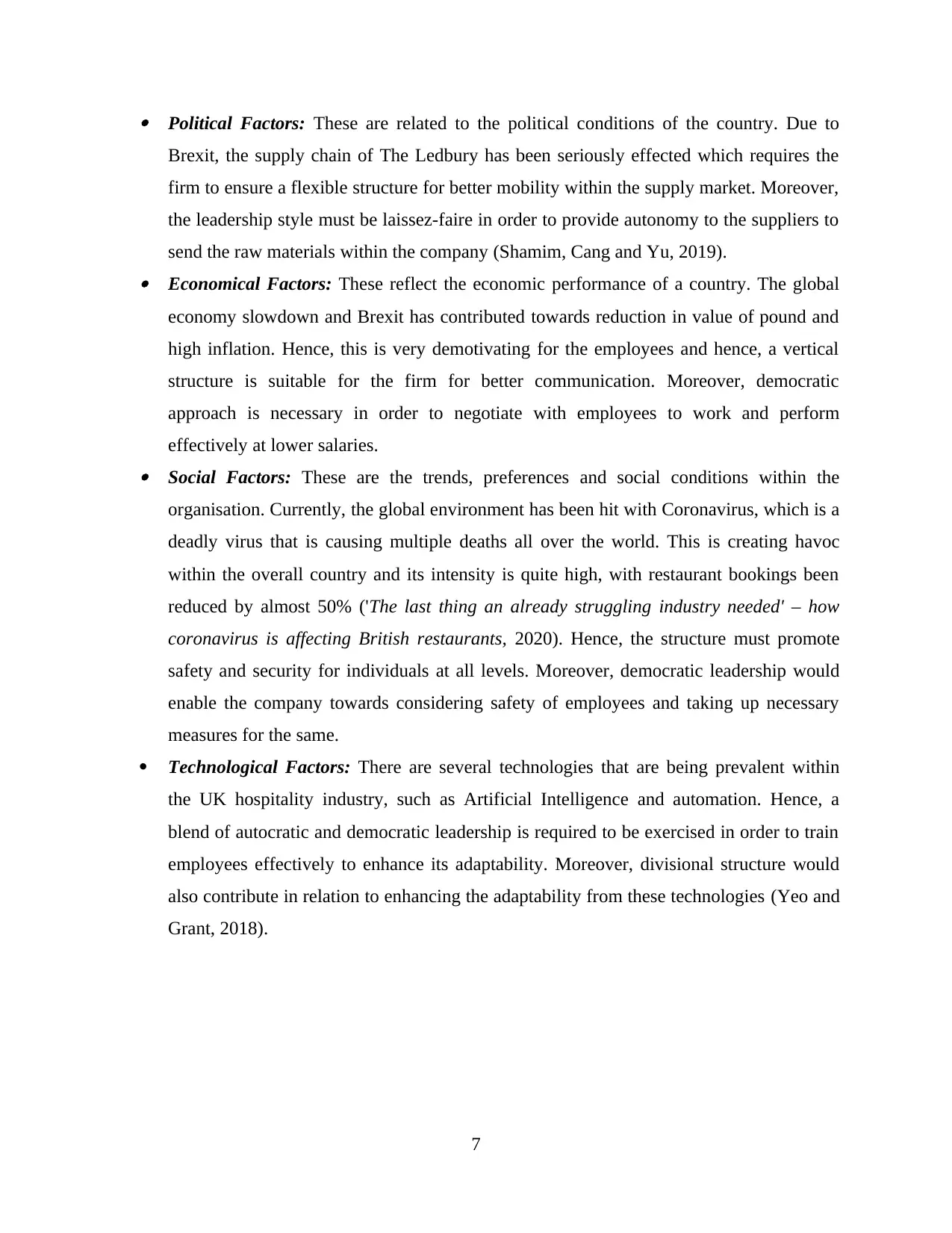
Political Factors: These are related to the political conditions of the country. Due to
Brexit, the supply chain of The Ledbury has been seriously effected which requires the
firm to ensure a flexible structure for better mobility within the supply market. Moreover,
the leadership style must be laissez-faire in order to provide autonomy to the suppliers to
send the raw materials within the company (Shamim, Cang and Yu, 2019). Economical Factors: These reflect the economic performance of a country. The global
economy slowdown and Brexit has contributed towards reduction in value of pound and
high inflation. Hence, this is very demotivating for the employees and hence, a vertical
structure is suitable for the firm for better communication. Moreover, democratic
approach is necessary in order to negotiate with employees to work and perform
effectively at lower salaries. Social Factors: These are the trends, preferences and social conditions within the
organisation. Currently, the global environment has been hit with Coronavirus, which is a
deadly virus that is causing multiple deaths all over the world. This is creating havoc
within the overall country and its intensity is quite high, with restaurant bookings been
reduced by almost 50% ('The last thing an already struggling industry needed' – how
coronavirus is affecting British restaurants, 2020). Hence, the structure must promote
safety and security for individuals at all levels. Moreover, democratic leadership would
enable the company towards considering safety of employees and taking up necessary
measures for the same.
Technological Factors: There are several technologies that are being prevalent within
the UK hospitality industry, such as Artificial Intelligence and automation. Hence, a
blend of autocratic and democratic leadership is required to be exercised in order to train
employees effectively to enhance its adaptability. Moreover, divisional structure would
also contribute in relation to enhancing the adaptability from these technologies (Yeo and
Grant, 2018).
7
Brexit, the supply chain of The Ledbury has been seriously effected which requires the
firm to ensure a flexible structure for better mobility within the supply market. Moreover,
the leadership style must be laissez-faire in order to provide autonomy to the suppliers to
send the raw materials within the company (Shamim, Cang and Yu, 2019). Economical Factors: These reflect the economic performance of a country. The global
economy slowdown and Brexit has contributed towards reduction in value of pound and
high inflation. Hence, this is very demotivating for the employees and hence, a vertical
structure is suitable for the firm for better communication. Moreover, democratic
approach is necessary in order to negotiate with employees to work and perform
effectively at lower salaries. Social Factors: These are the trends, preferences and social conditions within the
organisation. Currently, the global environment has been hit with Coronavirus, which is a
deadly virus that is causing multiple deaths all over the world. This is creating havoc
within the overall country and its intensity is quite high, with restaurant bookings been
reduced by almost 50% ('The last thing an already struggling industry needed' – how
coronavirus is affecting British restaurants, 2020). Hence, the structure must promote
safety and security for individuals at all levels. Moreover, democratic leadership would
enable the company towards considering safety of employees and taking up necessary
measures for the same.
Technological Factors: There are several technologies that are being prevalent within
the UK hospitality industry, such as Artificial Intelligence and automation. Hence, a
blend of autocratic and democratic leadership is required to be exercised in order to train
employees effectively to enhance its adaptability. Moreover, divisional structure would
also contribute in relation to enhancing the adaptability from these technologies (Yeo and
Grant, 2018).
7
⊘ This is a preview!⊘
Do you want full access?
Subscribe today to unlock all pages.

Trusted by 1+ million students worldwide
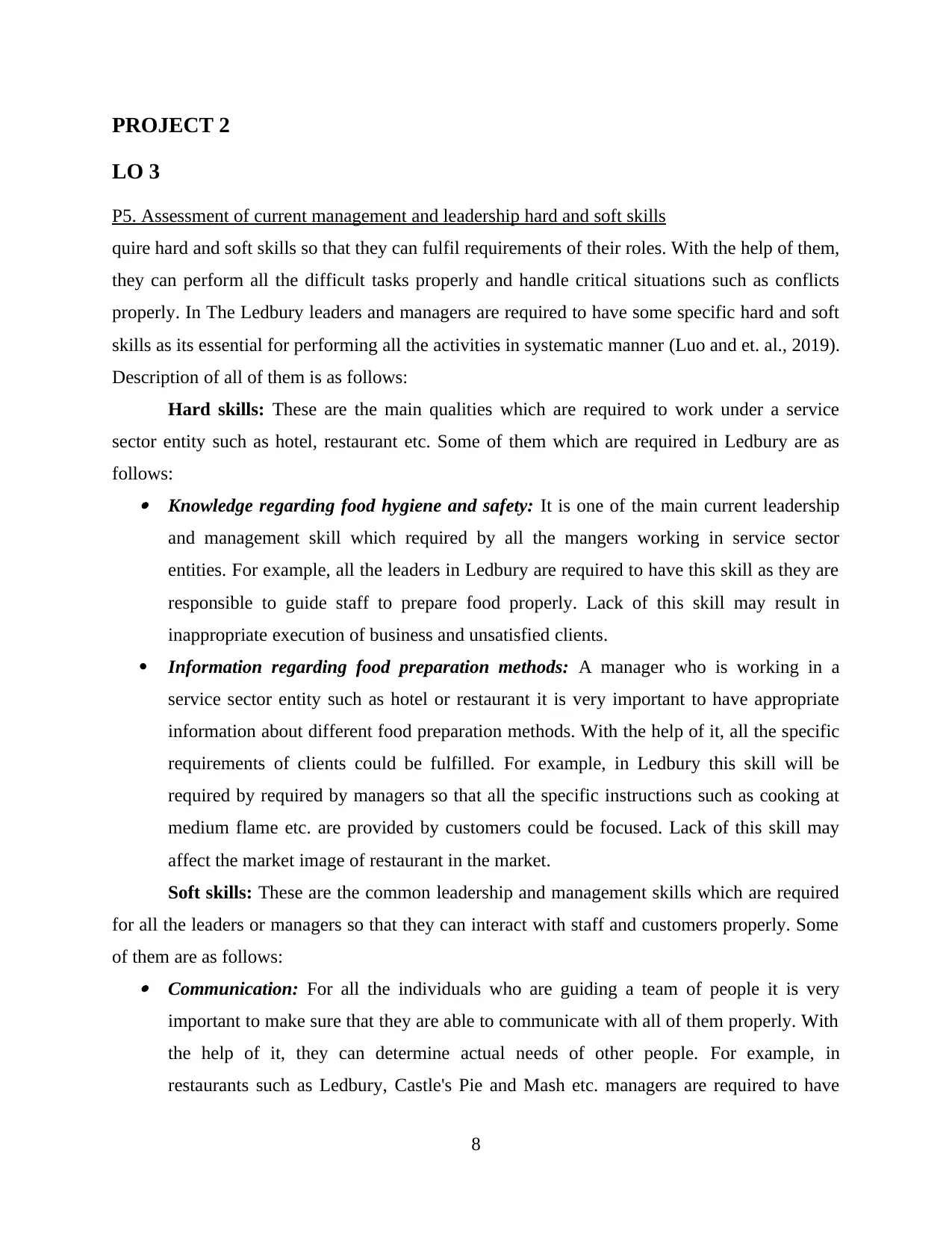
PROJECT 2
LO 3
P5. Assessment of current management and leadership hard and soft skills
quire hard and soft skills so that they can fulfil requirements of their roles. With the help of them,
they can perform all the difficult tasks properly and handle critical situations such as conflicts
properly. In The Ledbury leaders and managers are required to have some specific hard and soft
skills as its essential for performing all the activities in systematic manner (Luo and et. al., 2019).
Description of all of them is as follows:
Hard skills: These are the main qualities which are required to work under a service
sector entity such as hotel, restaurant etc. Some of them which are required in Ledbury are as
follows: Knowledge regarding food hygiene and safety: It is one of the main current leadership
and management skill which required by all the mangers working in service sector
entities. For example, all the leaders in Ledbury are required to have this skill as they are
responsible to guide staff to prepare food properly. Lack of this skill may result in
inappropriate execution of business and unsatisfied clients.
Information regarding food preparation methods: A manager who is working in a
service sector entity such as hotel or restaurant it is very important to have appropriate
information about different food preparation methods. With the help of it, all the specific
requirements of clients could be fulfilled. For example, in Ledbury this skill will be
required by required by managers so that all the specific instructions such as cooking at
medium flame etc. are provided by customers could be focused. Lack of this skill may
affect the market image of restaurant in the market.
Soft skills: These are the common leadership and management skills which are required
for all the leaders or managers so that they can interact with staff and customers properly. Some
of them are as follows: Communication: For all the individuals who are guiding a team of people it is very
important to make sure that they are able to communicate with all of them properly. With
the help of it, they can determine actual needs of other people. For example, in
restaurants such as Ledbury, Castle's Pie and Mash etc. managers are required to have
8
LO 3
P5. Assessment of current management and leadership hard and soft skills
quire hard and soft skills so that they can fulfil requirements of their roles. With the help of them,
they can perform all the difficult tasks properly and handle critical situations such as conflicts
properly. In The Ledbury leaders and managers are required to have some specific hard and soft
skills as its essential for performing all the activities in systematic manner (Luo and et. al., 2019).
Description of all of them is as follows:
Hard skills: These are the main qualities which are required to work under a service
sector entity such as hotel, restaurant etc. Some of them which are required in Ledbury are as
follows: Knowledge regarding food hygiene and safety: It is one of the main current leadership
and management skill which required by all the mangers working in service sector
entities. For example, all the leaders in Ledbury are required to have this skill as they are
responsible to guide staff to prepare food properly. Lack of this skill may result in
inappropriate execution of business and unsatisfied clients.
Information regarding food preparation methods: A manager who is working in a
service sector entity such as hotel or restaurant it is very important to have appropriate
information about different food preparation methods. With the help of it, all the specific
requirements of clients could be fulfilled. For example, in Ledbury this skill will be
required by required by managers so that all the specific instructions such as cooking at
medium flame etc. are provided by customers could be focused. Lack of this skill may
affect the market image of restaurant in the market.
Soft skills: These are the common leadership and management skills which are required
for all the leaders or managers so that they can interact with staff and customers properly. Some
of them are as follows: Communication: For all the individuals who are guiding a team of people it is very
important to make sure that they are able to communicate with all of them properly. With
the help of it, they can determine actual needs of other people. For example, in
restaurants such as Ledbury, Castle's Pie and Mash etc. managers are required to have
8
Paraphrase This Document
Need a fresh take? Get an instant paraphrase of this document with our AI Paraphraser
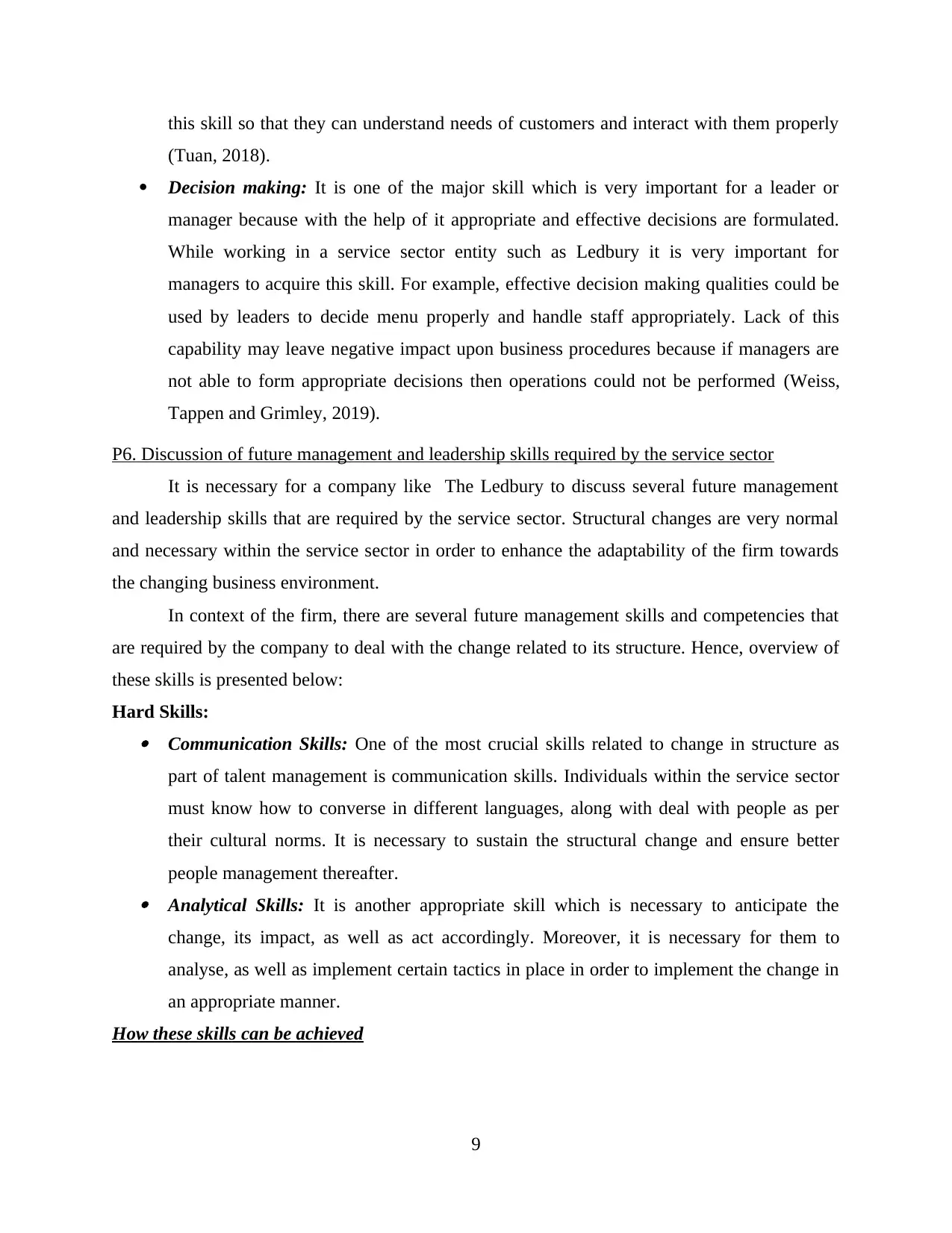
this skill so that they can understand needs of customers and interact with them properly
(Tuan, 2018).
Decision making: It is one of the major skill which is very important for a leader or
manager because with the help of it appropriate and effective decisions are formulated.
While working in a service sector entity such as Ledbury it is very important for
managers to acquire this skill. For example, effective decision making qualities could be
used by leaders to decide menu properly and handle staff appropriately. Lack of this
capability may leave negative impact upon business procedures because if managers are
not able to form appropriate decisions then operations could not be performed (Weiss,
Tappen and Grimley, 2019).
P6. Discussion of future management and leadership skills required by the service sector
It is necessary for a company like The Ledbury to discuss several future management
and leadership skills that are required by the service sector. Structural changes are very normal
and necessary within the service sector in order to enhance the adaptability of the firm towards
the changing business environment.
In context of the firm, there are several future management skills and competencies that
are required by the company to deal with the change related to its structure. Hence, overview of
these skills is presented below:
Hard Skills: Communication Skills: One of the most crucial skills related to change in structure as
part of talent management is communication skills. Individuals within the service sector
must know how to converse in different languages, along with deal with people as per
their cultural norms. It is necessary to sustain the structural change and ensure better
people management thereafter. Analytical Skills: It is another appropriate skill which is necessary to anticipate the
change, its impact, as well as act accordingly. Moreover, it is necessary for them to
analyse, as well as implement certain tactics in place in order to implement the change in
an appropriate manner.
How these skills can be achieved
9
(Tuan, 2018).
Decision making: It is one of the major skill which is very important for a leader or
manager because with the help of it appropriate and effective decisions are formulated.
While working in a service sector entity such as Ledbury it is very important for
managers to acquire this skill. For example, effective decision making qualities could be
used by leaders to decide menu properly and handle staff appropriately. Lack of this
capability may leave negative impact upon business procedures because if managers are
not able to form appropriate decisions then operations could not be performed (Weiss,
Tappen and Grimley, 2019).
P6. Discussion of future management and leadership skills required by the service sector
It is necessary for a company like The Ledbury to discuss several future management
and leadership skills that are required by the service sector. Structural changes are very normal
and necessary within the service sector in order to enhance the adaptability of the firm towards
the changing business environment.
In context of the firm, there are several future management skills and competencies that
are required by the company to deal with the change related to its structure. Hence, overview of
these skills is presented below:
Hard Skills: Communication Skills: One of the most crucial skills related to change in structure as
part of talent management is communication skills. Individuals within the service sector
must know how to converse in different languages, along with deal with people as per
their cultural norms. It is necessary to sustain the structural change and ensure better
people management thereafter. Analytical Skills: It is another appropriate skill which is necessary to anticipate the
change, its impact, as well as act accordingly. Moreover, it is necessary for them to
analyse, as well as implement certain tactics in place in order to implement the change in
an appropriate manner.
How these skills can be achieved
9
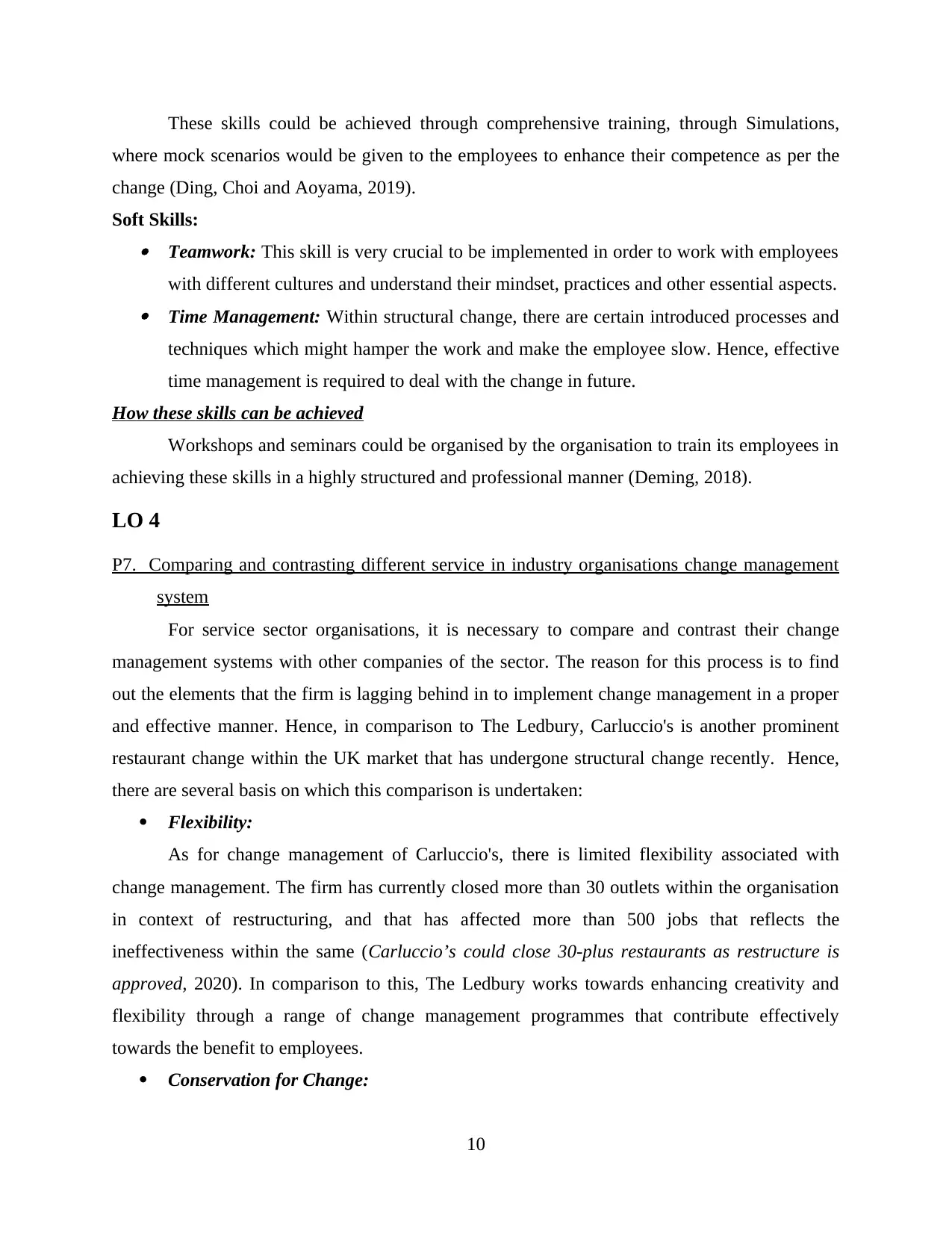
These skills could be achieved through comprehensive training, through Simulations,
where mock scenarios would be given to the employees to enhance their competence as per the
change (Ding, Choi and Aoyama, 2019).
Soft Skills: Teamwork: This skill is very crucial to be implemented in order to work with employees
with different cultures and understand their mindset, practices and other essential aspects. Time Management: Within structural change, there are certain introduced processes and
techniques which might hamper the work and make the employee slow. Hence, effective
time management is required to deal with the change in future.
How these skills can be achieved
Workshops and seminars could be organised by the organisation to train its employees in
achieving these skills in a highly structured and professional manner (Deming, 2018).
LO 4
P7. Comparing and contrasting different service in industry organisations change management
system
For service sector organisations, it is necessary to compare and contrast their change
management systems with other companies of the sector. The reason for this process is to find
out the elements that the firm is lagging behind in to implement change management in a proper
and effective manner. Hence, in comparison to The Ledbury, Carluccio's is another prominent
restaurant change within the UK market that has undergone structural change recently. Hence,
there are several basis on which this comparison is undertaken:
Flexibility:
As for change management of Carluccio's, there is limited flexibility associated with
change management. The firm has currently closed more than 30 outlets within the organisation
in context of restructuring, and that has affected more than 500 jobs that reflects the
ineffectiveness within the same (Carluccio’s could close 30-plus restaurants as restructure is
approved, 2020). In comparison to this, The Ledbury works towards enhancing creativity and
flexibility through a range of change management programmes that contribute effectively
towards the benefit to employees.
Conservation for Change:
10
where mock scenarios would be given to the employees to enhance their competence as per the
change (Ding, Choi and Aoyama, 2019).
Soft Skills: Teamwork: This skill is very crucial to be implemented in order to work with employees
with different cultures and understand their mindset, practices and other essential aspects. Time Management: Within structural change, there are certain introduced processes and
techniques which might hamper the work and make the employee slow. Hence, effective
time management is required to deal with the change in future.
How these skills can be achieved
Workshops and seminars could be organised by the organisation to train its employees in
achieving these skills in a highly structured and professional manner (Deming, 2018).
LO 4
P7. Comparing and contrasting different service in industry organisations change management
system
For service sector organisations, it is necessary to compare and contrast their change
management systems with other companies of the sector. The reason for this process is to find
out the elements that the firm is lagging behind in to implement change management in a proper
and effective manner. Hence, in comparison to The Ledbury, Carluccio's is another prominent
restaurant change within the UK market that has undergone structural change recently. Hence,
there are several basis on which this comparison is undertaken:
Flexibility:
As for change management of Carluccio's, there is limited flexibility associated with
change management. The firm has currently closed more than 30 outlets within the organisation
in context of restructuring, and that has affected more than 500 jobs that reflects the
ineffectiveness within the same (Carluccio’s could close 30-plus restaurants as restructure is
approved, 2020). In comparison to this, The Ledbury works towards enhancing creativity and
flexibility through a range of change management programmes that contribute effectively
towards the benefit to employees.
Conservation for Change:
10
⊘ This is a preview!⊘
Do you want full access?
Subscribe today to unlock all pages.

Trusted by 1+ million students worldwide
1 out of 15
Related Documents
Your All-in-One AI-Powered Toolkit for Academic Success.
+13062052269
info@desklib.com
Available 24*7 on WhatsApp / Email
![[object Object]](/_next/static/media/star-bottom.7253800d.svg)
Unlock your academic potential
Copyright © 2020–2026 A2Z Services. All Rights Reserved. Developed and managed by ZUCOL.





